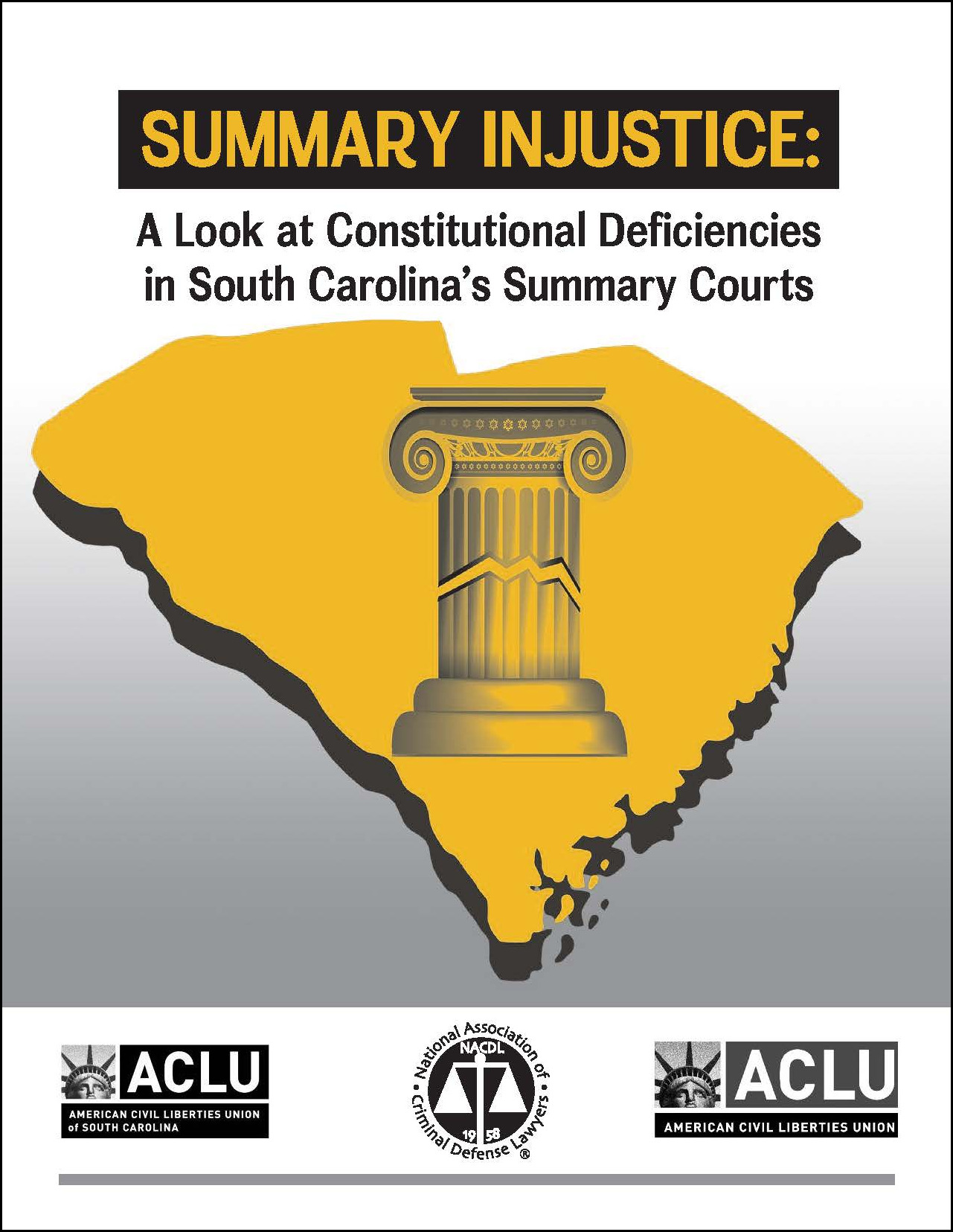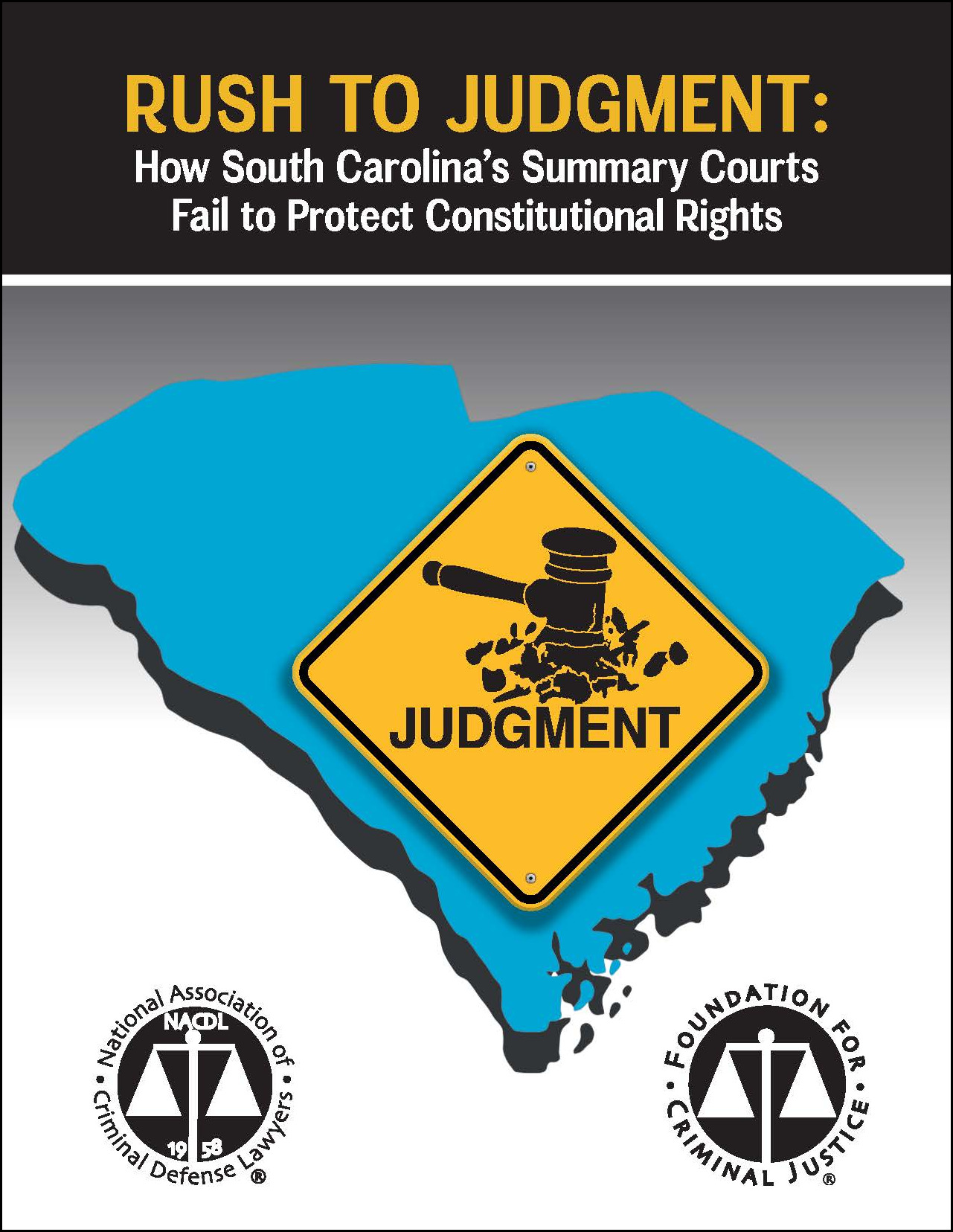Following disturbing reports of South Carolina courts in which those accused of crimes were charged, prosecuted, and in some instances, incarcerated, without a lawyer, NACDL, in partnership with the ACLU and the ACLU of South Carolina sought to examine what was occurring first-hand. Over the course of 8 months (Dec.2014 to July 2015) representatives of the 3 organizations conducted court observations in 27 summary courts throughout South Carolina.
The observations were stunning. There were courts in which not a single lawyer laid eyes on a case. Courtrooms where arresting officers served as prosecutors, judges meted out legal decision despite not being lawyers, and defendants were left wholly alone, as they were never even advised they had a constitutional right to a lawyer. These observations were documented in the 2016 report, Summary Injustice: A Look at Constitutional Deficiencies in South Carolina’s Summary Courts..
The observations were so concerning, NACDL undertook an additional investigation. Law students and legal professionals were trained to systematically gather information about court proceedings. For 3 months, in the winter and spring of 2016, they conducted research in 5 South Carolina counties{1}{1}Counties Studied: Charleston, Richland, Spartanburg, Florence, Orangeburg. Each day, teams observed misdemeanor court hearings in various venues. In every court, they found egregious, repeated constitutional violations. These observations and the data reviewed were compiled in the 2017 publication, Rush to Judgment: How South Carolina’s Summary Courts Fail to Protect Constitutional Rights.
The report findings included:
- Less than 1 in 10 defendants were represented by counsel.
- In more than 1 in 4 cases, the judge was a non-lawyer, the arresting officer served as prosecutor, and the accused had no lawyer.
- 19% of those convicted were sentenced to jail, virtually all of those individuals (97.4%) did not have a lawyer representing them.
Read Summary Injustice Read Rush to Judgment
In the wake of NACDL's reports, South Carolina Chief Justice, Donald Beatty, recalled thousands of warrants issued against individuals with low-level offenses who were accused of missing court dates or not paying fees and fines imposed. As well, the ACLU filed lawsuits in Beaufort, Bluffton and Lexington Counties. NACDL NEWS RELEASE
In March 2018 the US District Court denied the county's, Motion to Dismiss and in 2019 the US Court of Appeals affirmed that decision, allowing the suit to proceed.
News of Interest
- We Investigated Magistrates. Now, Lawmakers Want to Overhaul the System. by Joseph Cranney, The Post and Courier, December 11, 2019
- THE UNTOUCHABLES: These Judges Can Have Less Training Than Barbers but Still Decide Thousands of Cases Each Year, by Joseph Cranney, The Post and Courier, November 27, 2019
- Thousands of arrest warrants reviewed, following memo from S.C. Supreme Court judge, by Andrew Dys, The Herald, November 11, 2017.
- South Carolina chief justice tells judges to stop jailing poor defendants without lawyers, by Debra Cassens Weiss, ABA Journal, November 10, 2017.
- Thousands of arrest warrants for low-level offenders recalled under directive from South Carolina's chief justice, by Andrew Knapp, Post and Courier, November 9, 2017.
- 'Nightmare' directive from SC's Chief Justice has courts, cops scrambling, by Jack Kuenzie, WIS, November 6, 2017.
- ACLU Brings Federal Class Action Challenging South Carolina Sixth Amendment-Free Zones; Builds on Important NACDL Research, NACDL News Release, October 20, 2017.
- "SC's poor often lack lawyer in court, study says," by Jeff Jeffrey, South Carolina Lawyers Weekly, April 12, 2016.
- "Study shows SC's poor often underrepresented in court," by Zach Fox, Spartanburg Herald Journal, April 6, 2016.
- "National study reports injustice in SC's lower courts," by Tim Smith, The Island Packet, April 5, 2016.
- "The Marshall Project Opening Statement," Edited by Andrew Cohen, April 5, 2016.
- "Morning links: South Carolina municipal courts under fire," by Radley Balko, 'The Watch' Blog, The Washington Post, April 5, 2016.
- "National study reports injustice in state's lower courts," by Tim Smith, The Greenville News, April 4, 2016.
- "'Summary Injustice: A Look at Constitutional Deficiencies in South Carolina's Summary Courts," Sentencing Law and Policy Blog, April 4, 2016.
- "National study reports injustice in SC's lower courts," by Tim Smith, The State, April 4, 2016.
- "Few Lawyers and Little Justice in South Carolina's Lower Courts, Study Finds," by Rebecca McCray, TakePart, April 4, 2016.
- NACDL News Release - Summary Injustice, April 4, 2016.
- "In S.C.’s lowest criminal courts, the poor suffer without attorneys, study by ACLU, lawyers finds," by Andrew Knapp, The Post and Courier, April 3, 2016.
- Study cites due process violations in low-level courts as Charleston officials tout 'groundbreaking' improvement, by Andrew Knapp, The Post and Courier, January 22, 2017.
- NACDL News Release - Rush to Judgment, January 18, 2017.

.jpg?width=125&height=161)
.jpg?width=125&height=161)












